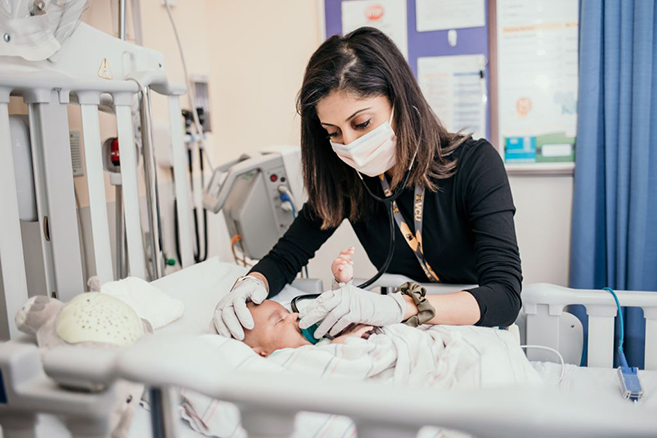Educational overview
Pediatric residency curriculum
Level 1
The first year of training is designed to ground residents in the foundational skills and clinical judgment required to care for children with empathy and excellence. Residents gain experience in a range of inpatient and outpatient settings, supported by both faculty and senior residents, while developing confidence in managing acute and chronic pediatric conditions.
Incoming residents benefit from a focused summer orientation curriculum that prepares them for the fast-paced clinical environment, followed by a structured year-long series of protected educational conferences. These include morning reports and a Tuesday afternoon didactic series covering essential pediatric topics and evolving practices. Departmental and subspecialty conferences further enhance residents’ critical thinking and introduce new advances in child health.
Daily rounds are collaborative, interdisciplinary experiences, where residents learn alongside nurses, social workers, chaplains, therapists, pharmacists, and educators. First-year residents also begin contributing to the education of medical students and participate in four weeks of supervised night shifts, offering exposure to urgent decision-making while ensuring access to guidance and mentorship.
Level 2
The second year encourages deeper clinical engagement and growing autonomy. Residents take on leadership roles within clinical teams and begin focused training in pediatric subspecialties such as adolescent medicine and hematology/oncology. Each rotation offers a structured curriculum of readings, interactive sessions, and faculty-guided learning.
Residents personalize their training through longitudinal tracts aligned with their evolving interests—whether in primary care, adolescent health, public/global health, advocacy, or pediatric subspecialties. Each tract includes dedicated didactics and field experiences that allow residents to explore broader healthcare needs and community-based care models.
During this year, residents manage more complex cases, lead teaching activities on the wards, and supervise junior learners, while continuing to receive support from upper-level residents, fellows, and faculty. In settings like the NICU and PICU, residents take part in procedure-based care and high-acuity decision-making. Through supervised night shifts and continuous feedback, second-year residents refine their ability to respond to diverse clinical needs while mentoring others.
Level 3
The third year focuses on leadership and integration of knowledge across care settings. Senior residents lead inpatient teams, guide case-based discussions, support junior colleagues, and manage clinical operations during both day and night shifts. They also serve as first responders to emergencies and consults within the hospital, with faculty always available to support their growth.
Residents continue in their individualized longitudinal tracks, deepening their expertise in areas aligned with their goals. They may also pursue electives in child psychiatry, dermatology, radiology, orthopedics, or other specialties within the medical center. This flexibility encourages residents to expand their perspectives and clinical versatility.
With increasing responsibility comes broader impact—third-year residents not only lead care teams but also shape the learning climate for the entire residency program through teaching, role modeling, and service.
Evaluations
Feedback and self-reflection are integral to each stage of training. Using New Innovations, residents receive timely evaluations from peers and faculty, which are reviewed quarterly in mentorship meetings. These sessions offer tailored guidance to ensure each resident’s development is supported holistically, with attention to their goals, strengths, and evolving needs.
Patient logs
Residents log all patient encounters into New Innovations. This includes all inpatient, continuity and subspecialty patient encounters.
Procedure logs
Pediatric and medicine-pediatrics residents are required to document procedures as proof of technical skill. Only successful procedures need to be logged. Certification and proficiency in procedural skills will be determined according to the Department of Pediatrics policy on procedural competence.
Learn about our residency program

Pediatric residency curriculum opportunities
Our curriculum emphasizes the delivery of compassionate medical care, an active role in child advocacy, a dedication to community service, a plan for lifelong learning and a desire for the advancement of medical knowledge. These are the essential qualities that we believe define an exceptional pediatrician.
Learn more about our curriculum:
Become a CHoR resident
Residents are selected through the National Resident Matching Program. You must apply using the ERAS System.
